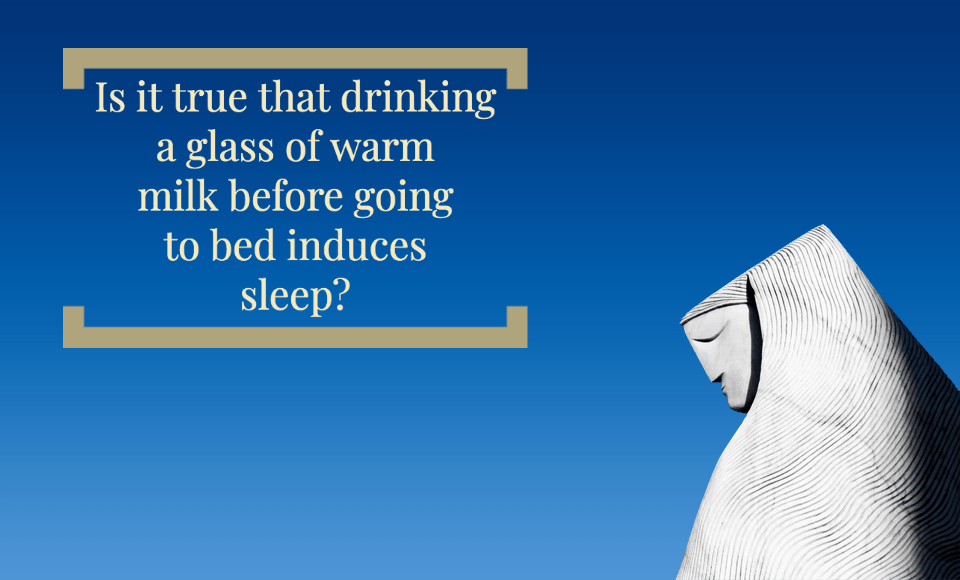Drinking a cup of warm milk is most likely to be one of your easiest options. But is this just an old wives’ tale or truly have scientific studies on its effectiveness?
According to Drew Dawson, a sleep and fatigue expert, and director at Appleton Institute at Central Queensland University, drinking milk may help you with youMilk contains L-tryptophan which is an essential amino acidr sleeping problems, but not for the reasons you think.
. Tryptophan is a precursor for the neurotransmitter serotonin which in turn can be converted into the hormone melatonin. During the day, melatonin levels are low or non-existent. Its secretion starts at night about two hours earlier to your routine sleeping time.
Melatonin helps in telling the body what time of the day it is. It is an important part of the circadian system. Drinking a glass of milk at night is not itself sufficient to put you directly to sleep, but combine L-tryptophan with soothing warmth, and feeling of fullness.
This is how it works: One of the things for which the body uses L- tryptophan is to make serotonin; a brain chemical that scientific research has suggested may be a key link in the mechanism that triggers the onset of sleep. Serotonin is secreted by neurons to the reticular activating system, located deep in the brain. This system controls the level of activities of the whole central nervous system and is partly responsible for the mind’s ability to direct its attention. The lower portion of the reticular activating system is thought to maintain the brain’s normal state of wakefulness. And insomnia has been linked with damage to the neurons that normally secrete serotonin into the system.
When the supply of serotonin is reduced due to the damaged neurons, its shortfall tends to keep one awake since the reticular activating system does not become dormant in the absence of serotonin. In such circumstances, an extra supply of serotonin through milk may assist in getting a good night’s sleep.
What’s with milk being warm?
The temperature of milk doesn’t really induce sleep nor likely to influence sleep onset. However, warm milk may have psychological significance. The habit of drinking a glass of warm milk before bedtime may stimulate psychological activities such as recalling memories of your childhood with your mother, which helps you to relax.
The human brain has the ability to recognize routine and predictable activities. If you have a routine each night such as meditation, reading a book, watching a movie, brushing teeth, and drinking milk, then your brain and your physiology recognize this behavior as part of the preparatory process for sleep and respond accordingly, making it easier to fall asleep once you are in bed.
What published studies say?
One of the studies published in the Nordic Journal of Psychiatry discovered that melatonin-rich milk could help elderly people sleep better. Associating milk with a good night’s sleep will most likely cause sleepiness.
In an article in 2015 in the Journal of Medicinal Food, people who have memories of caregivers giving them milk to induce sleep benefit from that psychological association. (https://www.ncbi.nlm.nih.gov/pubmed/16195124)
In 2009, a study in the European Journal of Clinical Nutrition found that fermented milk improved sleep efficiency and wakening episodes of subjects who were aged 60 through 81. (https://www.nature.com/articles/1602898)
Milk combined with other sleep-inducing activities
Sleep-inducing activities have been practiced by many people to lessen the use of sleeping pills and medications on sleeping problems. Several studies examined how milk and other sleep improving activities helped study participants’ sleep better.
In 2014, a study published in the journal BMC Geriatrics found that the older adult participants who engaged in both activities—physical activity and drinking milk—had less difficulty initiating sleep (DIS) than people who did just one of those sleep-enhancing activities. (https://www.ncbi.nlm.nih.gov/pmc/articles/PMC4247642/)
Additional reading:
Sleep (Wikipedia)
Methods of falling asleep (Wikipedia)
Related post:
